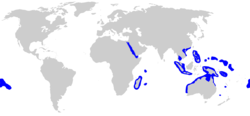Gray reef shark
2008/9 Schools Wikipedia Selection. Related subjects: Insects, Reptiles and Fish
| Gray reef shark | ||||||||||||||||
|---|---|---|---|---|---|---|---|---|---|---|---|---|---|---|---|---|
 |
||||||||||||||||
| Conservation status | ||||||||||||||||
| Scientific classification | ||||||||||||||||
|
||||||||||||||||
| Binomial name | ||||||||||||||||
| Carcharhinus amblyrhynchos ( Bleeker, 1856) |
||||||||||||||||
 Range of gray reef shark
|
The grey reef shark, Carcharhinus amblyrhynchos, is one of the most common sharks in Indo-Pacific waters, from the Red Sea to Easter Island. It is found at depths down to about 250 m in lagoons and close to islands and coral reefs.
As its name suggests, the shark is grey overall, with a white underside. The tips of most fins, except the first dorsal fin, are darker, and the trailing edge of the caudal fin has a prominent black margin. Some individuals have a white pattern on the leading edge of the dorsal fin. It has been recorded at up to 2.55 m. The blacktip reef shark looks similar, and is also common, but it is distinguished by a black tip on the first dorsal fin.
Behaviour
They are active during the day, but more so at night, feeding on reef fishes, squids, octopus, and various crustaceans such as crabs and shrimp.
This species is social, aggregating in favored areas, often near dropoffs at the edge of a reef, or in atoll passes where there is a strong current. They are often curious, will investigate scuba divers, and have been implicated in attacks, although there is some debate as to whether the sharks are fundamentally aggressive or have simply reacted badly to perceived threats by divers. When threatened they exhibit a distinctive threat behaviour, adopting a hunched posture with the body bent into an "S" shape.
Reproduction is viviparous, with 1 to 6 pups in a litter.
The numbers of grey reef sharks have declined in recent years.